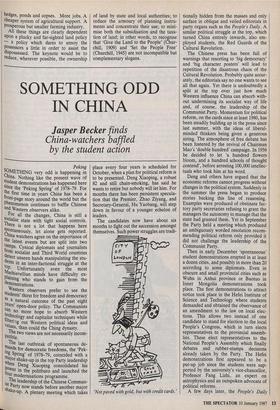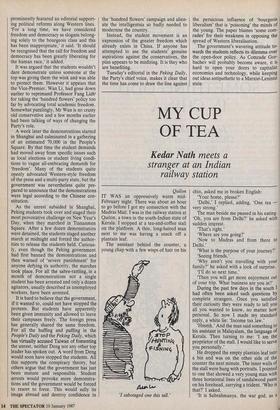SOMETHING ODD IN CHINA
Jasper Becker finds
China-watchers baffled by the student action
Peking SOMETHING very odd is happening in China. Nothing like the present wave of student demonstrations has happened here since the 'Peking Spring' of 1978-79. For the first time in years China has been a front-page story around the world but the Phenomenon continues to baffle Chinese and Western observers alike. For all the changes, China is still a socialist state with tight social controls. There is not a lot that happens here sPontaneously, let alone gets reported. China watchers agree on the importance of the latest events but are split into two c&s. Cynical diplomats and journalists 'tom socialist and Third World countries detect unseen hands manipulating the stu- dents in an inter-factional struggle at the t°P. Unfortunately even the most Machiavellian minds have difficulty ex- Planting who stands to gain from the demonstrations. Western observers prefer to see the students' thirst for freedom and democracy as a natural outcome of the past eight Years open-door policy. The Communists an no more hope to absorb Western technology and capitalist techniques while filteri ng out Western political ideas and values, than could the Ching dynasty.
The two views are not necessarily incom- patible.
The last outbreak of spontaneous de- ttands for democratic freedoms, the 'Pek- ing. Spring' of 1978-79, coincided with a Major shake-up in the top Party leadership when Deng Xiaoping consolidated his power in the politburo and launched the :114 modernisations programme. The leadership of the Chinese Commun- ist Party now stands before another major shake-up. A plenary meeting which takes
place every four years is scheduled for October, when a plan for political reform is to be presented. Deng Xiaoping, a robust 82 and still chain-smoking, has said he wants to retire but nobody will let him. For months there has been persistent specula- tion that the Premier, Zhao Ziyang, and Secretary-General, Hu Yaobang, will step down in favour of a younger echelon of leaders.
The candidates now have about six months to fight out the succession amongst themselves. Such power struggles are tradi-
'Not paved with gold, but with credit cards.' tionally hidden from the masses and only surface in oblique and veiled editorials in party organs such as the People's Daily. A similar political struggle at the top, which turned China entirely inwards, also em- ployed students, the Red Guards of the Cultural Revolution.
The Chinese press has been full of warnings that resorting to 'big democracy' and 'big character posters' will lead to repetition of the disastrous chaos of the Cultural Revolution. Probably quite accur- ately, the editorials say no one wants to see all that again. Yet there is undoubtedly a split at the top over just how much Western influence China can absorb with- out undermining its socialist way of life and, of course, the leadership of the Communist Party. Momentum for political reform, on the cards since at least 1980, has been steadily building up in the press since last summer, with the ideas of liberal- minded thinkers being given a generous airing. The atmosphere of free debate has been fostered by the revival of Chairman Mao's 'double hundred' campaign. In 1956 he decided to let 'a hundred flowers bloom, and a hundred schools of thought contend', before arresting 100,000 intellec- tuals who took him at his word.
Deng and others have argued that the economic reforms cannot progress without changes in the political system. Suddenly in the summer the press began to produce stories backing this line of reasoning. Examples were produced of obstinate fac- tory party secretaries refusing to grant the managers the autonomy to manage that the state had granted them. Yet in September the Party held a meeting which produced an ambiguously worded resolution recom- mending political reform only provided it did not challenge the leadership of the Communist Party.
Then in early December 'spontaneous' student demonstrations erupted in at least a dozen cities, and possibly in more than 20 according to some diplomats. Even in obscure and small provincial cities such as Wuhu in Anhui province or Baotuo in Inner Mongolia demonstrations took place. The first demonstrations to attract notice took place in the Hefei Institute of Science and Technology where students demanded and obtained the observance of an amendment to the law on local elec- tions. This allows two instead of one candidate to stand for election to the local People's Congress, which in turn elects representatives to the provincial assemb- lies. These elect representatives to the National People's Assembly which finally debates and rubber-stamps decisions already taken by the Party. The Hefei demonstrations first appeared to be a put-up job since the students were sup- ported by the university's vice-chancellor, Professor Fang Lizhi, an expert on astrophysics and an outspoken advocate of political reforms.
A few days later, the People's Daily
prominently featured an editorial support- ing political reforms along Western lines. 'For a long time, we have considered freedom and democracy as slogans belong- ing solely to the bourgeois class and this has been inappropriate,' it said. 'It should be recognised that the call for freedom and democracy has been greatly liberating for the human race,' it added.
It was argued that the students wouldn't dare demonstrate unless someone at the top was giving them the wink and was able to protect them. However it appears that the Vice-Premier, Wan Li, had gone down earlier to reprimand Professor Fang Lizh, for taking the 'hundred flowers' policy too far by advocating total academic freedom. Somewhat puzzlingly, Mr Wan is no crusty old conservative and a few months earlier had been talking of ways of changing the Party's role.
A week later the demonstrations started in Shanghai and culminated in a gathering of an estimated 70,000 in the People's Square. By that time the student demands had moved away from specific issues such as local elections or student living condi- tions to vague all-embracing demands for 'freedom'. Many of the students quite openly advocated Western-style freedom of the press and a multi-party state, but the government was nevertheless quite pre pared to announce that the demonstrations were legal according to the Chinese con- stitution.
As the unrest subsided in Shanghai, Peking students took over and staged their most provocative challenge on New Year's Day, when they marched in Tiananmen Square. After a few dozen demonstrators were detained, the students staged another march at midnight and forced the author- ities to release the students held. Curious- ly, even though the Peking government had first banned the demonstrations and then warned of 'severe punishment' for anyone defying its authority, the marches took place. For all the sabre-rattling, in a month of demonstrations not a single student has been arrested and only a dozen agitators, usually described as unemployed workers, have been arrested.
It is hard to believe that the government, if it wanted to, could not have stopped the protests. But students have apparently been given immunity and allowed to leave their campuses freely. The foreign press has generally shared the same freedom.
For all the huffing and puffing in the
People's Daily and the Peking Daily, which has virtually accused Taiwan of fomenting the unrest, neither Deng nor any other top leader has spoken out. A word from Deng would soon have stopped the students. All this supports the conspiracy theory, but
others argue that the government has just been mature and responsible. Student arrests would provoke more demonstra- tions and the government would be forced to resort to force. This would sully its image abroad and destroy confidence in the 'hundred flowers' campaign and alien- ate the intelligentsia so badly needed to modernise the country.
Instead, the student movement is an expression of the greater freedom which already exists in China. If anyone has attempted to use the students' genuine aspirations against the conservatives, the plan appears to be misfiring. It is they who are benefiting.
Tuesday's editorial in the Peking Daily, the Party's chief voice, makes it clear that the time has come to draw the line against
the pernicious influence of 'bourgeois liberalism' that is 'poisoning' the minds of the young. The paper blames 'some com- rades' for their weakness in opposing the spread of Western liberalisation.
The government's wavering attitude to- wards the students reflects its dilemma over the open-door policy. As Comrade Gor- bachev will probably become aware, it is hard to open your doors to capitalist economics and technology, while keeping out ideas antipathetic to a Marxist-Leninist state.











































 Previous page
Previous page